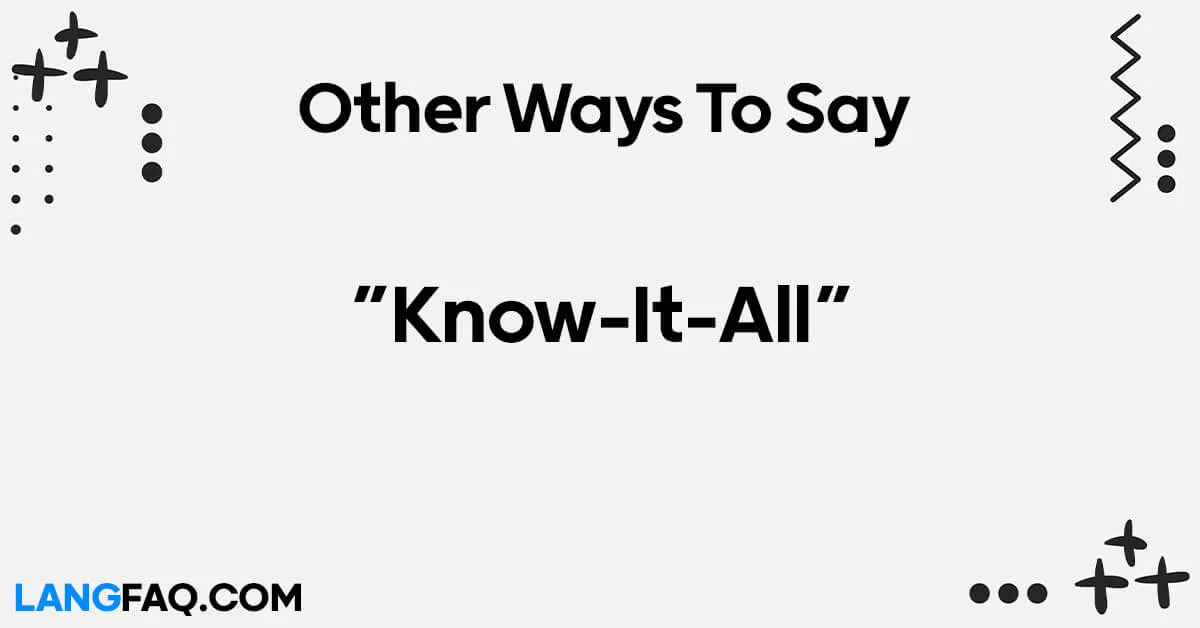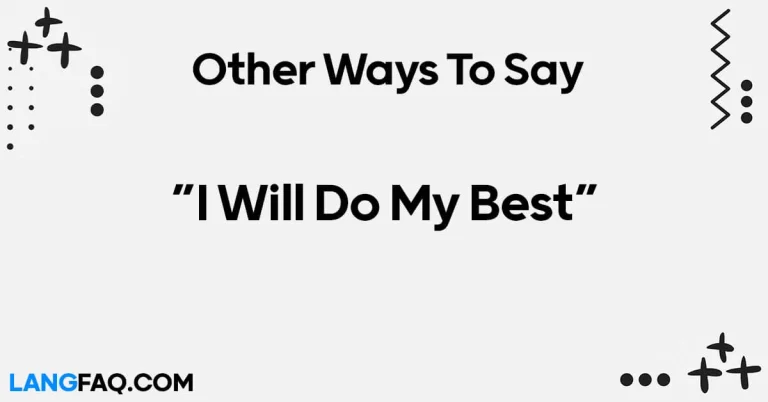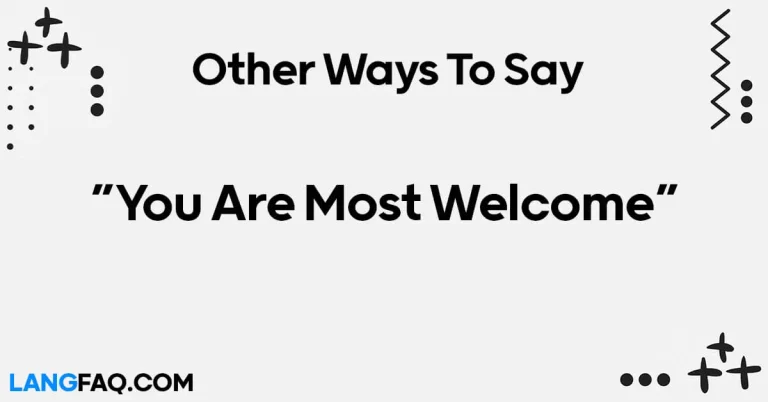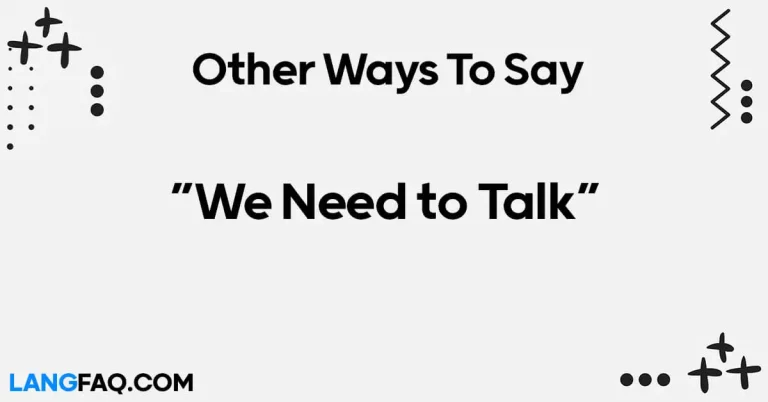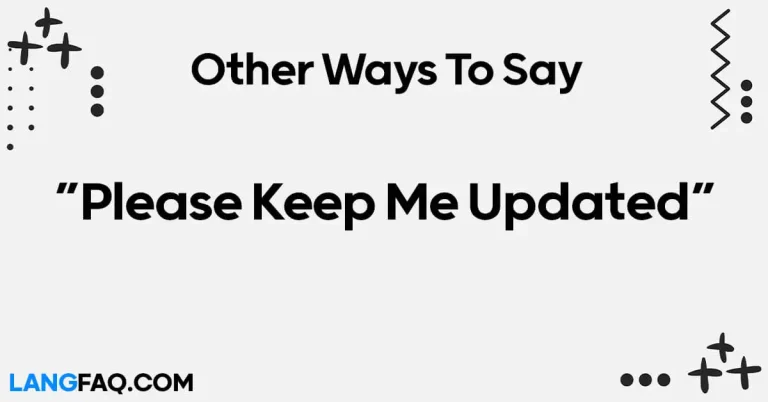Welcome to a linguistic journey where we delve into the vast lexicon of expressions that capture the essence of someone who seems to know everything. Whether you encounter these individuals in a workplace setting, social gatherings, or family dinners, we’ve compiled 12 creative ways to articulate the concept without using the phrase “Know-It-All.”
12 Other Ways to Say “Know-It-All”
Here are 12 other ways to say “Know-It-All”:
- Sage Maven
- Wisdom Wunderkind
- Omniscient Oracle
- Fountain of Facts
- Enlightened Scholar
- Brainiac Luminary
- Cognizant Connoisseur
- Epistemological Aficionado
- Savvy Savant
- Perceptive Prodigy
- Insightful Luminary
- Erudition Virtuoso
Here’s a table with meanings and examples for the 12 other ways to say “Know-It-All”:
| Expression | Meaning | Example |
|---|---|---|
| Sage Maven | An individual with extensive wisdom and experience. | Emily is our office Sage Maven, always offering insightful advice. |
| Wisdom Wunderkind | A person, usually young, with remarkable knowledge and wisdom. | Despite being only 25, Jake is a Wisdom Wunderkind in the field of astrophysics. |
| Omniscient Oracle | Someone with almost prophetic insights and a deep understanding. | Sarah, the Omniscient Oracle, accurately predicted the market trends. |
| Fountain of Facts | A person who effortlessly provides information on various topics. | Tom is a Fountain of Facts; ask him anything, and he’ll have an answer. |
| Enlightened Scholar | An individual embodying a love for learning and intellectual pursuits. | Professor Williams, an Enlightened Scholar, has published numerous academic papers. |
| Brainiac Luminary | Someone with brilliant analytical skills and deep knowledge. | In the debate, Lisa proved herself to be a Brainiac Luminary, dissecting complex issues effortlessly. |
| Cognizant Connoisseur | A person with refined taste for knowledge and a sophisticated approach. | The Cognizant Connoisseur, David, seamlessly integrates art and science in his discussions. |
| Epistemological Aficionado | An individual passionate about the study and philosophy of knowledge. | Rebecca’s status as an Epistemological Aficionado is evident in her philosophical approach to every topic. |
| Savvy Savant | A knowledgeable person who is also street-smart and practical. | Mike, the Savvy Savant, navigated the business world with a combination of knowledge and shrewdness. |
| Perceptive Prodigy | A young person with an intuitive grasp of complex concepts. | Young Alice, a Perceptive Prodigy, astounded the experts with her understanding of quantum mechanics. |
| Insightful Luminary | A person whose wisdom brings illumination to discussions. | At the conference, Dr. Johnson proved to be an Insightful Luminary, shedding light on pressing issues. |
| Erudition Virtuoso | A master in the art of knowledge, exhibiting expertise in various fields. | Meet Professor Carter, the Erudition Virtuoso, whose knowledge spans literature, science, and history. |
This table unveils a rich spectrum of expressions to replace the term “Know-It-All.” Each alternative carries a distinct meaning, from the seasoned wisdom of the Sage Maven to the youthful brilliance of the Wisdom Wunderkind. Whether you seek prophetic insights like the Omniscient Oracle or appreciate the practical intelligence of the Savvy Savant, these alternatives offer nuanced ways to acknowledge and celebrate knowledge in various individuals. Language, as illustrated in this table, provides us with a tapestry of creative expressions to elevate our descriptions and interactions.
Is It Correct to Say “Know-It-All”?
Certainly! The term “Know-It-All” is a commonly used colloquial expression in English. It is typically employed to describe a person who acts as if they have extensive knowledge on every subject and tends to be overly confident or arrogant about their expertise.
Definition and Usage:
- Definition: A “Know-It-All” refers to an individual who claims or appears to have comprehensive knowledge on various topics and may exhibit a tendency to assert their opinions or correct others frequently.
- Usage: The term is often used informally to characterize someone who comes across as arrogant or condescending due to their perceived or asserted superior knowledge.
Example Sentences:
- “John can be a bit of a Know-It-All in meetings, always insisting he has the right answer.”
- “Don’t be a Know-It-All; it’s essential to remain open to different perspectives and ideas.”
- “She’s become the office Know-It-All, constantly correcting everyone else’s work.”
Variations and Synonyms:
- Smart Alec: An informal term used to describe a person who behaves in a way that is perceived as annoyingly smart or clever.
- Egomaniac: Refers to an individual who has an excessive preoccupation with themselves and their opinions.
- Pedant: Describes someone who is overly concerned with formal rules and details.
When to Use:
- The term is suitable for casual conversations, especially when discussing someone’s behavior or attitude.
- It’s important to use it judiciously, as it can carry a negative connotation and might be perceived as derogatory.
Tips:
- While the term is widely understood, it’s essential to consider the tone and context in which you use it.
- Be mindful of the potential negative impact, as labeling someone a Know-It-All can be seen as dismissive or disrespectful.
Professional Mail Example With “Know-It-All”
Subject: Request for Collaboration and Input on Project
Dear [Recipient’s Name],
I trust this email finds you well. I am reaching out to you regarding the upcoming project that our teams will be collaborating on, and I believe your valuable insights will greatly contribute to its success.
I am aware of your reputation as a subject matter expert in [relevant field], and your track record of success in similar projects precedes you. Your expertise in [specific area] is particularly commendable and aligns seamlessly with the goals we aim to achieve in this endeavor.
I am reaching out to you because I believe in fostering a collaborative and inclusive environment. Your perspective and wealth of knowledge will undoubtedly bring a unique dimension to our project. We are assembling a team of professionals, each contributing their specific strengths, and having a Know-It-All like yourself onboard would be truly beneficial.
I would appreciate it if we could schedule a brief meeting at your earliest convenience to discuss your potential involvement further. Your insights will not only enhance the quality of our project but also contribute to the professional growth of our team members.
Please let me know your availability for a meeting, and if there are specific areas you would like to focus on or contribute to. I am confident that your expertise will make a significant impact, and I look forward to the prospect of working together.
Thank you for considering this collaboration, and I am eager to hear your thoughts on how we can make this project a success.
Best regards,
[Your Full Name] [Your Position] [Your Contact Information]
Sage Maven: A Beacon of Wisdom
In the realm of knowledge, few titles command as much respect as “Sage Maven.” This expression encapsulates the essence of someone whose wisdom is not just vast but also deeply rooted in experience. Picture a mentor figure, someone you turn to for invaluable insights, guidance, and a touch of seasoned sagacity.
When and Where to Use:
- Formal Context: In professional settings, the term “Sage Maven” is apt for acknowledging a senior colleague or mentor, especially one with a wealth of industry experience.
- Informal Context: Among friends, it can be playfully used to tease the wise, experienced friend in the group.
Example: Formal: “Our team is fortunate to have a Sage Maven like Dr. Rodriguez, whose decades of experience have steered us through countless challenges.”
Informal: “Whenever we’re stuck, we know Jim, our Sage Maven, will have the perfect advice, like the oracle of our friend group.”
Variations:
- Colleague Context: Knowledge Navigator
- Mentor-Mentee Context: Guiding Luminary
Email Sample:
Subject: Seeking Your Wise Counsel
Dear [Name],
I hope this email finds you well. As our team faces a complex challenge, your role as our Sage Maven is paramount. Your insights have always been a guiding light, and I would be grateful for your wisdom in navigating this situation.
Wisdom Wunderkind: Nurturing Brilliance in Youth
“Wisdom Wunderkind” introduces a vibrant twist to acknowledging knowledge, focusing on the youthful exuberance of brilliant minds. This term is particularly relevant in settings where age doesn’t limit intellectual prowess. Imagine a young colleague or friend whose understanding of complex subjects is nothing short of remarkable.
When and Where to Use:
- Formal Context: In professional discussions, it can be employed to commend a young colleague who consistently brings fresh, insightful perspectives to the table.
- Informal Context: Among friends or in educational settings, it playfully highlights the brilliance of a young mind.
Example: Formal: “We’re fortunate to have a Wisdom Wunderkind like Sarah on the team, infusing innovative ideas into every project.”
Informal: “Meet Alex, our Wisdom Wunderkind; at 21, they’ve already published research that’s turning heads in the academic world.”
Variations:
- Colleague Context: Bright Mind Prodigy
- Mentor-Mentee Context: Emerging Luminary
Email Sample:
Subject: Impressed by Your Insight
Dear [Name],
Your recent contributions to our projects have been nothing short of extraordinary. It’s clear we have a Wisdom Wunderkind among us, and I’m eager to see your continued impact.
Omniscient Oracle: Insights Beyond the Ordinary
The term “Omniscient Oracle” brings an air of mystique to the realm of knowledge, suggesting someone with almost prophetic insights. Envision a person whose advice seems to transcend the ordinary, providing strategic foresight and guidance akin to consulting an oracle.
When and Where to Use:
- Formal Context: In business or strategic planning meetings, it can be used to acknowledge someone whose insights consistently guide the team toward success.
- Informal Context: Among friends, it adds a touch of playfulness to appreciating a friend who always seems to know what’s coming.
Example: Formal: “Our CEO, the Omniscient Oracle of our industry, accurately predicted market trends that gave us a competitive edge.”
Informal: “Ask Jenny about anything, she’s our Omniscient Oracle, predicting which movies will be a hit before they’re released.”
Variations:
- Colleague Context: Strategic Visionary
- Mentor-Mentee Context: Guiding Oracle
Email Sample:
Subject: Seeking Your Strategic Insights
Dear [Name],
In navigating our upcoming challenges, your role as our Omniscient Oracle is crucial. Your ability to foresee outcomes has been instrumental in our success, and I’d value your insights on our current situation.
Fountain of Facts: Immerse Yourself in Knowledge
For those who effortlessly provide information on diverse topics, the term “Fountain of Facts” aptly captures the image of a person whose conversations are akin to a refreshing cascade of knowledge. Imagine someone who not only knows a lot but shares it in a way that enlightens and enriches every interaction.
When and Where to Use:
- Formal Context: In academic or research settings, it can be used to acknowledge a colleague known for their extensive knowledge base.
- Informal Context: Among friends, it’s a playful way to appreciate the friend who always has interesting tidbits to share.
Example: Formal: “Dr. Williams, our Fountain of Facts in biology, made our research project immensely insightful with her wealth of knowledge.”
Informal: “Jane is a living Fountain of Facts; every conversation with her feels like attending a fascinating lecture.”
Variations:
- Colleague Context: Information Cascade
- Mentor-Mentee Context: Knowledge Mentor
Email Sample:
Subject: Valuing Your Extensive Knowledge
Dear [Name],
Your role as our Fountain of Facts has consistently elevated our discussions. I appreciate the depth of knowledge you bring to our projects, making them richer and more enlightening.
Enlightened Scholar: Embodiment of Academic Pursuits
“Enlightened Scholar” is a term that goes beyond mere knowledge, emphasizing a love for learning and intellectual pursuits. Visualize someone whose understanding of subjects extends into the realms of academia, making every conversation a captivating exploration.
When and Where to Use:
- Formal Context: In educational or research institutions, it suits professors or researchers known for their deep engagement with their subject matter.
- Informal Context: Among friends who share a passion for learning, it can be used warmly to acknowledge someone’s intellectual pursuits.
Example: Formal: “Professor Turner, our Enlightened Scholar in literature, has inspired countless students with her profound understanding of classic works.”
Informal: “David isn’t just knowledgeable; he’s an Enlightened Scholar, turning every casual chat into an intellectual adventure.”
Variations:
- Colleague Context: Academic Luminary
- Mentor-Mentee Context: Learning Guide
Email Sample:
Subject: Inspired by Your Intellectual Pursuits
Dear [Name],
Your role as our Enlightened Scholar is truly commendable. Your love for learning is evident in every lecture, making our academic journey more enriching.
Brainiac Luminary: Brilliance with Analytical Prowess
The “Brainiac Luminary” combines analytical brilliance with a profound understanding of complex concepts. Envision someone who not only grasps intricate details but can articulate and share them in a way that leaves others intellectually stimulated.
When and Where to Use:
- Formal Context: In research or technical fields, it can be employed to describe a colleague whose analytical skills are exceptional.
- Informal Context: Among friends with a penchant for deep conversations, it highlights the brilliance of someone’s mind.
Example: Formal: “Dr. Patel, our Brainiac Luminary in physics, has a knack for simplifying complex theories, making them accessible to everyone.”
Informal: “Jack is a real Brainiac Luminary; discussing philosophy with him feels like a journey into the depths of understanding.”
Variations:
- Colleague Context: Analytical Genius
- Mentor-Mentee Context: Thought Leader
Email Sample:
Subject: Impressed by Your Analytical Brilliance
Dear [Name],
I wanted to express my admiration for your role as our Brainiac Luminary. Your ability to dissect complex concepts is truly remarkable and adds immense value to our team.
Cognizant Connoisseur: Refined Taste for Knowledge
The term “Cognizant Connoisseur” brings forth an image of someone with a refined taste for knowledge, akin to savoring a fine wine. This expression encapsulates an individual whose insights are not only knowledgeable but are also delivered with sophistication and discernment.
When and Where to Use:
- Formal Context: In business or cultural discussions, it’s suitable for acknowledging someone whose knowledge is not just broad but comes with a refined approach.
- Informal Context: Among friends who appreciate deep conversations, it can be playfully used to recognize the friend with a sophisticated worldview.
Example: Formal: “Ms. Thompson, our Cognizant Connoisseur of international affairs, always brings a nuanced perspective to our global strategy meetings.”
Informal: “Chris isn’t just a know-it-all; he’s a Cognizant Connoisseur, turning casual chats into enlightening discussions on art, literature, and beyond.”
Variations:
- Colleague Context: Knowledge Aficionado
- Mentor-Mentee Context: Wise Mentor
Email Sample:
Subject: Appreciation for Your Refined Insights
Dear [Name],
I wanted to express my gratitude for your role as our Cognizant Connoisseur. Your insights always add a touch of sophistication to our discussions, making them more enriching.
Epistemological Aficionado: Love for the Study of Knowledge
“Epistemological Aficionado” delves into the love for the study of knowledge itself, portraying someone passionate about understanding the nature and limits of knowledge. Imagine engaging with an individual who not only possesses information but also contemplates its philosophical aspects.
When and Where to Use:
- Formal Context: In academic or philosophical discussions, it’s fitting for someone deeply immersed in the theoretical aspects of knowledge.
- Informal Context: Among friends who enjoy pondering profound questions, it adds a touch of intellectual depth to describe someone’s expertise.
Example: Formal: “Professor Rodriguez, our Epistemological Aficionado in philosophy, challenges us to explore the very foundations of our understanding.”
Informal: “Lily isn’t just knowledgeable; she’s an Epistemological Aficionado, turning casual conversations into explorations of the nature of knowledge.”
Variations:
- Colleague Context: Theoretical Sage
- Mentor-Mentee Context: Philosophy Mentor
Email Sample:
Subject: Inspired by Your Philosophical Insights
Dear [Name], I’ve always admired your role as our Epistemological Aficionado.
Your ability to delve into the philosophical aspects of our work adds a unique and thought-provoking dimension.
Savvy Savant: Knowledge Beyond Academia
For those whose insights extend beyond traditional knowledge, the term “Savvy Savant” comes to the forefront. Imagine someone not just academically inclined but also street-smart, offering practical and shrewd advice.
When and Where to Use:
- Formal Context: In business or entrepreneurial settings, it can be used to describe a colleague with a keen sense of practical knowledge.
- Informal Context: Among friends or in everyday scenarios, it playfully acknowledges someone who combines book smarts with street smarts.
Example: Formal: “John, our Savvy Savant in marketing, has an intuitive understanding of consumer trends, making him an invaluable asset to our team.”
Informal: “When it comes to life advice, Amy is our Savvy Savant, blending book knowledge with real-world insights in the most practical way.”
Variations:
- Colleague Context: Practical Guru
- Mentor-Mentee Context: Street-Smart Mentor
Email Sample:
Subject: Appreciation for Your Practical Wisdom
Dear [Name],
I’ve always admired your role as our Savvy Savant. Your ability to provide practical insights has made a significant impact on our projects, and I wanted to express my appreciation.
Perceptive Prodigy: Youthful Intuition in Knowledge
“Perceptive Prodigy” brings forth the image of a young individual with an intuitive grasp of complex concepts, surpassing their years in understanding. Envision a colleague or friend whose ability to comprehend and analyze information goes beyond what is expected for their age.
When and Where to Use:
- Formal Context: In professional settings, it can be employed to commend a young colleague whose insights and understanding exceed typical expectations.
- Informal Context: Among friends or in educational settings, it playfully highlights the brilliance of a young mind that outshines its years.
Example: Formal: “Our Perceptive Prodigy, Sarah, consistently impresses us with her analytical skills and ability to grasp complex market dynamics.”
Informal: “Meet Alex, our Perceptive Prodigy; despite being the youngest in the group, they always provide fresh insights that leave us in awe.”
Variations:
- Colleague Context: Young Genius
- Mentor-Mentee Context: Rising Star
Email Sample:
Subject: Inspired by Your Youthful Brilliance
Dear [Name],
I’ve been consistently impressed by your role as our Perceptive Prodigy. Your ability to grasp complex concepts is truly remarkable, and I look forward to seeing your continued impact on our projects.
Insightful Luminary: Illuminating Conversations
The “Insightful Luminary” is a term that goes beyond knowledge, emphasizing someone whose wisdom casts a radiant glow on discussions. Imagine an individual whose insights not only inform but also inspire, turning ordinary conversations into intellectually enriching exchanges.
When and Where to Use:
- Formal Context: In meetings or discussions where a deep understanding of a subject is combined with the ability to inspire and enlighten.
- Informal Context: Among friends or in mentorship scenarios, it warmly acknowledges someone who brings light to discussions.
Example: Formal: “Dr. Carter, our Insightful Luminary in psychology, has the remarkable ability to make complex theories accessible and inspiring to all.”
Informal: “Rachel isn’t just knowledgeable; she’s an Insightful Luminary, turning every coffee chat into an enlightening discussion about life and learning.”
Variations:
- Colleague Context: Inspirational Guide
- Mentor-Mentee Context: Illuminating Mentor
Email Sample:
Subject: Gratitude for Your Enlightening Insights
Dear [Name],
I wanted to express my gratitude for your role as our Insightful Luminary. Your ability to make complex topics accessible and inspiring is truly commendable, and I appreciate the light you bring to our discussions.
Erudition Virtuoso: Masterclass in Knowledge
Encounter the “Erudition Virtuoso,” a term reserved for someone whose expertise spans diverse fields, making them a virtuoso in the pursuit of understanding. Imagine engaging with an individual who not only possesses deep knowledge but effortlessly navigates various domains.
When and Where to Use:
- Formal Context: In professional settings or academic circles, it’s fitting for acknowledging a colleague or professor known for their exceptional expertise across multiple disciplines.
- Informal Context: Among friends or in mentorship scenarios, it recognizes someone who is a true virtuoso in their understanding of various subjects.
Example: Formal: “Our Erudition Virtuoso, Professor Anderson, has set a standard for interdisciplinary excellence with his contributions to science, literature, and history.”
Informal: “Mark isn’t just knowledgeable; he’s an Erudition Virtuoso, seamlessly shifting from discussing economics to art with unparalleled ease.”
Variations:
- Colleague Context: Multidisciplinary Maestro
- Mentor-Mentee Context: Knowledge Virtuoso
Email Sample:
Subject: Commendation for Your Multidisciplinary Excellence
Dear [Name],
Your role as our Erudition Virtuoso is truly commendable. Your ability to navigate and excel in various fields sets a standard for interdisciplinary excellence, and I’m grateful for the wealth of knowledge you bring to our team.
Frequently Asked Questions (FAQs)
Q: Can these terms be used interchangeably? Absolutely! While each term carries its unique flavor, they can be used interchangeably based on the context. Experiment with different expressions to add variety to your conversations.
Q: How can I politely acknowledge someone’s knowledge without using the term “Know-It-All”? Choose from our list of expressions based on the person’s style. For a seasoned individual, “Sage Maven” or “Enlightened Scholar” might be fitting, while “Perceptive Prodigy” suits a younger expert.
Q: Are these terms universally accepted? While some expressions may be informal, they capture the essence of expertise positively. Use them contextually, and you’ll likely find your audience appreciating the creativity in your language.
Q: Can these terms be used in professional settings? Absolutely. Many of these expressions, such as “Cognizant Connoisseur” and “Insightful Luminary,” carry a sense of professionalism. Use them judiciously to elevate the tone of your professional interactions.
Q: How do these expressions contribute to effective communication? Using varied expressions enhances communication by avoiding monotony. It shows thoughtfulness in acknowledging someone’s knowledge, fostering positive and engaging conversations.
Q: Can I create my own term for a knowledgeable person? Certainly! Language is dynamic, and creativity is encouraged. Feel free to craft your own expressions, and who knows, they might catch on!
Conclusion
In this linguistic exploration, we’ve uncovered 12 vibrant expressions to replace the common phrase “Know-It-All.” Each term carries a unique nuance, adding depth and creativity to how we acknowledge and appreciate knowledge. Experiment with these expressions, and watch your conversations flourish with newfound linguistic richness.

